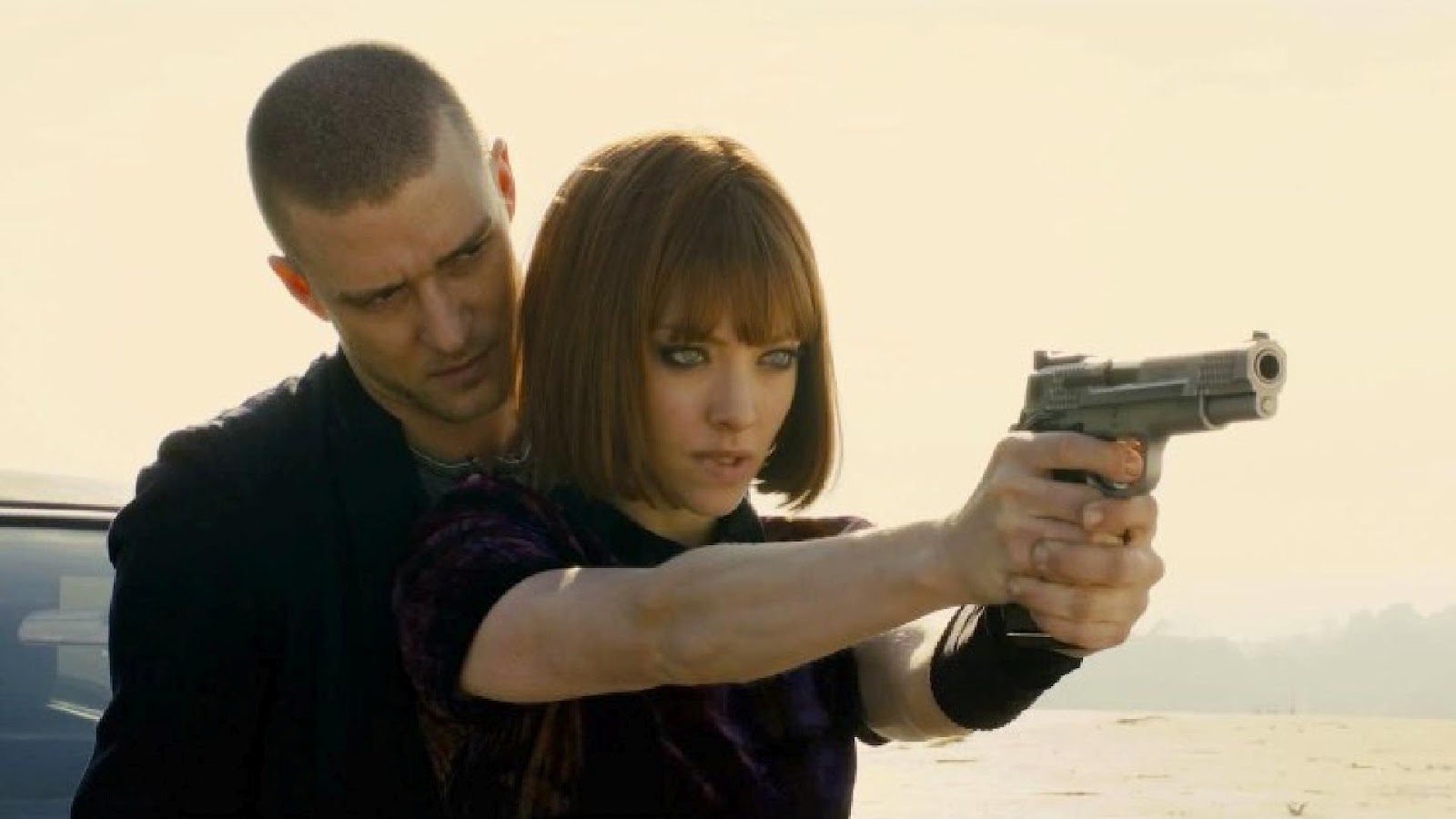
MPAA Rating: PG-13 | Rating: ★½
Release year: 2011
Genre: Action, Sci-Fi Director: Niccol
They say time is money. What if that were literally true? In Time imagines a world where time is used as the primary commodity. You buy, sell, and live by the clock, which is conveniently located in a luminous green counter embedded in your wrist. Genetic engineering has allowed human beings to live forever, given that they can earn the time. At age 25, your countdown begins at one year. The rich have hundreds, even thousands of years at their disposal. The poor eke out life one day at a time, hoping not to “time out.” Because of the genetic engineering, no one truly ages after 25–everyone looks like a constant 25-year-old, despite being decades beyond this. It’s a world of beautiful young people, all struggling to keep the remaining time they have.
One of these strugglers is Will Salas, portrayed by Justin Timberlake. Will has a chance run-in with Henry Hamilton, a wealthy man who has already lived over a century. He’s still got a century left on his counter, but he’s done with living. Henry shares his cynical philosophy of life with Will before both fall asleep. Will wakes up with Henry’s century ticking down on his arm, with the words “don’t waste my time” scrawled on a nearby window pane. Henry times himself out and falls off a bridge, leaving Will both a rich man and a suspect in Henry’s death. Will takes his newfound time to the wealthiest “time zone” of his city–or state…or country…it’s never explained–with the motivation to both live the high-life while somehow exacting a sort of revenge on the wealthy. “I’m going to take them for all they’re worth,” he broodingly explains to his cab driver.
In Time is based on an interesting sci-fi premise, much like Andrew Niccol’s earlier sci-fi drama, Gattaca. Yet where Gattaca‘s ideas were freshly presented with a fascinating story and well-developed characters, In Time struggles from numerous plot holes and frustrating script elements. The film is set in the “near future,” despite Henry being over 100 years old at this point, and the contemporary attire and use of vehicles. (Perhaps “near future” is relative). While Will is the central protagonist, there is no clear antagonist to counter his behaviors. Is it the cynical timekeeper–i.e. law enforcer–played by Cillian Murphy, sent to hunt down Will for his supposed crimes? Is it the suave gangster from the ghetto (Alex Pettyfer) who seems to nurse an unexplained grudge against Will? Is it the wealthiest man in the world, Weis, (Vincent Kartheiser), who is hoarding all the time he can? We’re never quite sure. Will doesn’t seem certain either as he becomes a near-future Robin Hood, robbing banks of time and giving it away to the poor. The timekeeper also seems familiar with Will’s father, though the relationship is never explained. And how did Will–apparently an ordinary young factory worker–become so gifted at driving in high speed pursuits and shooting guns? Plenty of other time-related ideas require taking them at face value without any clear explanation of how or why, such as how time is transferred between people by touching their wrists together, or how time is stored in gleaming silver VHS-style boxes (you’d think in the future they could develop something more compact).
In Time is heavy-handed in both its puns and themes. The “don’t waste my time” message of Henry is only one of dozens that occur in the first 15 minutes. If puns are your thing, you might find yourself amused, but I quickly grew tired of the different ways “time” can fit into a catch phrase. The themes range from economics to philosophy to morality, each fitted with its own time-centered puns. Social Darwinism is taken quite literally; the wealthy cite Darwin as their reason for hoarding time and attempting to kill off the poor. “For a few to be immortal, many must die,” coldly states Weis. Henry laments that he has lived as long as he has: “We were not meant for immortality. We want to die. We need to.”
This latter assertion rings so false that it made me groan in the theater. Anyone who has recently experienced the death of a loved one would never make the same statement. Nor could anyone who takes Scripture at its word: that we were designed to be in eternal fellowship with a loving God; that death is a result from sin and not inherently good; that God restores us through Jesus so that we might have the hope of eternal life once again. Of course, immortality in a world of sin apart from God would be quite miserable; I’d even call it “hell.” But to say that we were designed to die flies in the face of the hope found in Jesus.
As a thriller, it repeatedly uses the motif of the “countdown to zero” moment to elicit suspense, nullifying its effectiveness. As an action film, the biggest showdowns are extremely underwhelming; Will’s big “fight” with Pettyfer’s gangster is basically an arm-wrestling scene. It’s all an interesting idea, but In Time fails to make an effective film from its premise. Don’t waste your time with this one. (Pun intended).
IMDB Listing: http://www.imdb.com/title/tt1637688/